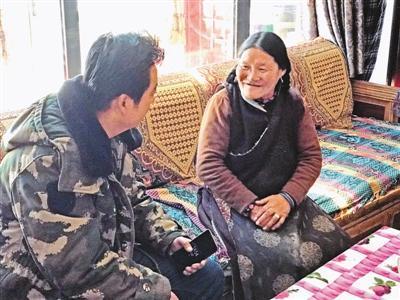By Liu Fang, Zhi Xinghua Source:China Tibet News 2021年08月20日 12:18

Photo shows Khenrab (R) talking with a cadre who has helped her. [China Tibet News/Wang Xiaoli, Xie Wei, Wang Lijun]
Background:
72-years-old Khenrab, female, born in 1947, is a villager of Gulu Town of Seni District in Nagqu City, southwest China's Tibet Autonomous Region.
Khenrab was placed in foster care with relatives when she was born and never saw her parents. Before the democratic reform, they belonged to the Sangshung Tribe. Khenrabo grazed cattle and sheep and worked hard during the day, and slept with livestock at night. She never had enough food and clothes.
"Every day I watched my lord's children (about the same age as me) eating meat and drinking milk, dressing warmly and living comfortably. I wondered when I would be able to live such a life!" The old woman sighed.
She remembered clearly that when she was 10 years old, she learned to sing an idyll with her herding companions. After the lord found out, she was beaten black and blue and nearly had her tongue cut out.
"I couldn't get up for several days. At the risk of having their hands chopped off, my relatives secretly milked a little goat's milk at night and fed me slinkingly."
Speaking of this, the old woman showed a deep scar on her neck and said angrily, "I didn't know why they were so cruel!"
In 1959, the democratic reform was carried out and the suffering serfs saw hope.
With the help of cadres and the PLA, Khenrab and her family received three cattle, five sheep and two tents. She said excitedly, "being the master of myself, I was looking forward to the future. I couldn't be happier!"
"Thanks to the party and the government for taking care of our family from all aspects," Khenrab said, "the party committee and government of Gulu Townhas listed my family among registered poor households enjoying five guarantees, and provided me elderly subsidy. Now, I have all sorts of subsidy income which amounts to 9000 yuan RMB a year. In addition, the town and the village also send me commodities for daily use, and these cadres help me with my housework."
In 2018, Khenrab and her two granddaughters moved to the poverty alleviation relocation site, and lived in a new house with a courtyard totally covering over 100 m².